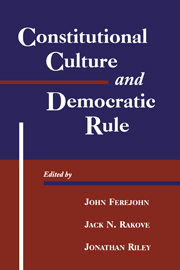Book contents
- Frontmatter
- Contents
- List of Contributors
- Editors' Introduction
- PART ONE CONSTITUTIONAL BEGINNINGS AND TRANSITIONS
- 1 Constitutional Problematics, circa 1787
- 2 Inventing Constitutional Traditions: The Poverty of Fatalism
- 3 The Birth Logic of a Democratic Constitution
- PART TWO CONSTITUTIONAL STRUCTURE AND DESIGN
- PART THREE CONSTITUTIONAL CHANGE AND STABILITY
- Name Index
- Subject Index
1 - Constitutional Problematics, circa 1787
Published online by Cambridge University Press: 20 March 2010
- Frontmatter
- Contents
- List of Contributors
- Editors' Introduction
- PART ONE CONSTITUTIONAL BEGINNINGS AND TRANSITIONS
- 1 Constitutional Problematics, circa 1787
- 2 Inventing Constitutional Traditions: The Poverty of Fatalism
- 3 The Birth Logic of a Democratic Constitution
- PART TWO CONSTITUTIONAL STRUCTURE AND DESIGN
- PART THREE CONSTITUTIONAL CHANGE AND STABILITY
- Name Index
- Subject Index
Summary
Modern commentators on the U.S. Constitution of 1787 generally share two broad but closely related sets of assumptions about its origins. First, we tend to ascribe a high measure of coherence and purpose to the original intentions and understandings upon which the framers and ratifiers of 1787–8 acted. We regard the Constitution not only as the bundle of bargains required to replace the “imbecile” union of the Articles of Confederation with an effective national government, but also as the expression of a deeper body of norms, values, and expectations that together constituted a coherent and integrated theory of a federal republic. This belief has in turn sustained seemingly endless searches for the true sources of these norms in different intellectual traditions, modes of thinking, or “discourses.” Second, in reconstructing this theory, scholars often emphasize the extent to which the Constitution was designed to establish a set of self-enforcing and self-correcting mechanisms that would preserve the general stability of the constitutional system against the vicissitudes of time and fortune. The constitutional scheme of checks and balances (embracing both the separation of powers and federalism) was contrived to maintain an enduring equilibrium while permitting gradual adjustments to take place (through either Article V amending procedures or judicial review) without blunt trauma. This scheme would neutralize the “mischiefs of faction” that so alarmed James Madison and other framers, thereby demonstrating that it was entirely realistic to extend the republican form of government to the dimensions of an expanding national empire of quasi-sovereign states.
- Type
- Chapter
- Information
- Constitutional Culture and Democratic Rule , pp. 41 - 70Publisher: Cambridge University PressPrint publication year: 2001



